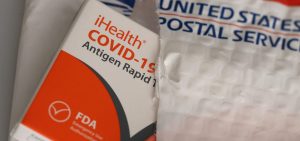News
Free COVID tests by mail are back, starting Monday
By: Selena Simmons-Duffin | NPR
Posted on:
WASHINGTON (NPR) — The Biden administration is bringing COVID tests back to mailboxes.

This announcement comes with a recognition that COVID hospitalizations in the U.S. peaked in January for the past three years running and that testing is an important component of minimizing the spread of the infection.
Many of the pandemic programs that allowed Americans to get tested, treated and vaccinated for COVID — all for free — went away this year as the pandemic emergency designation expired.
But now the Department of Health and Human Services, through its Administration for Strategic Preparedness and Response, is making a $600 million investment in manufacturing of COVID tests.
The money has been awarded to 12 U.S. manufacturers and will buy 200 million tests. HHS Secretary Xavier Becerra said the idea is to bolster the U.S. supply chain and reduce reliance on overseas manufacturers.
The first batch of free rapid tests by mail went out during the Omicron wave of January 2022 — that was the apex of COVID infection seen so far. The free test offer was renewed several times, with a total of 755 million free tests distributed.
The government suggests you don’t throw out unused tests even if the expiration date has passed. First, check the lot numbers of any you have on hand at COVIDtests.gov — the expiration dates for many have been extended and the website will list them.
The strategic preparedness office also gives free COVID tests to long-term care facilities, low-income senior housing, uninsured individuals, and underserved communities.
9(MDU1ODUxOTA3MDE2MDQwNjY2NjEyM2Q3ZA000))

